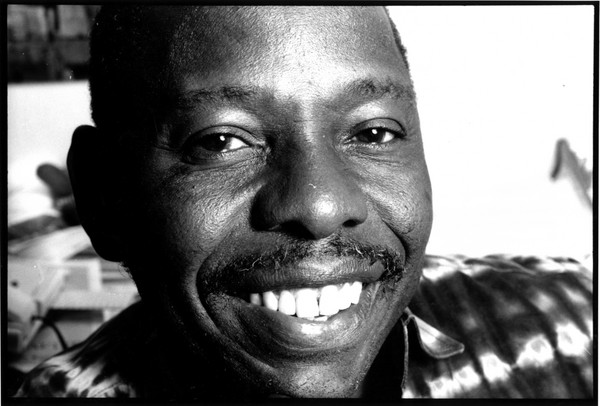The pay-out by Shell to the families of nine executed Nigerian activists who brought a lawsuit against the oil company in the US has been rightly hailed as a victory for the relatives. But it is only a very small step along the road to justice and redress for human rights abuses committed in the context of oil exploitation.
Relatives of author Ken Saro-Wiwa (pictured) and eight other Ogoni activists hanged by the Nigerian government in 1995 accused Shell and its subsidiaries of complicity in the activist’s deaths and other human rights abuses in the oil-rich Niger delta.
 On Monday evening, Shell agreed to pay US$15.5 million to the families of the victims as part of an out-of-court settlement dismissing their claims. Shell denies “any wrongdoing or liability”, claiming that the pay-out is a “humanitarian gesture”. The settlement forestalls trial proceedings which would have exposed the oil company’s collusion in the brutal crackdown against the Ogoni movement by the military regime of the time.
On Monday evening, Shell agreed to pay US$15.5 million to the families of the victims as part of an out-of-court settlement dismissing their claims. Shell denies “any wrongdoing or liability”, claiming that the pay-out is a “humanitarian gesture”. The settlement forestalls trial proceedings which would have exposed the oil company’s collusion in the brutal crackdown against the Ogoni movement by the military regime of the time.
The settlement can be seen as a partial step towards holding companies such as Shell accountable for the human rights impact of their operations. It will hopefully make the extractive industries more sensitive to the risk of possible human rights claims in future. Part of the pay-out will be used to establish a trust fund for social development programs in the Ogoni region.
But the settlement makes only a small dent in the impunity surrounding human rights violations in the context of oil exploitation by multi-national companies in Nigeria and elsewhere.
Shortly after the execution of the Ogoni activists, the Center for Economic and Social Rights (CESR) and the Nigerian human rights organization Social and Economic Rights Action Center (SERAC) brought a complaint against Nigeria before the African Commission on Human and People’s Rights. The petition highlighted the devastating impact of oil exploitation on the rights to health, housing, food and livelihood of the Ogoni population.
In a ground-breaking decision, the African Commission held the military government responsible for violating the African Charter on Human and People’s Rights and called on the newly-democratic government to take remedial action.
CESR and SERAC brought the case because we were adamant that the execution of Saro-Wiwa would not kill the struggle for the basic economic and social rights of the Ogoni people. The Commission’s findings upheld the demands which cost him and his fellow activists their lives. However, eight years on, the Nigerian government has still not heeded the Commission’s call to compensate those affected, to clean-up the environmental damage and to curb the oil industry’s destruction of livelihoods. The result has been ongoing economic and social rights violations as well as continued repression.
The lawsuit – brought by Nigerian plaintiffs in a US Court against an Anglo-Dutch corporation - shows that the search for accountability can also be multi-national. Victims denied justice and redress in their own country will continue to take their struggle to international human rights commissions and foreign courts in the hope of making their voices heard.
It can take years of tireless and sustained campaigning for these efforts to yield results - five years in the case of CESR/SERAC v. Nigeria, and thirteen in the case of Wiwa v. Shell. The small but significant victory achieved by the Ogoni plaintiffs and the lawyers and NGOs who worked with them proves that these efforts are not in vain.
For further background and documentation on Wiwa v Shell, visit the Center for Constitutional Rights and EarthRights International.